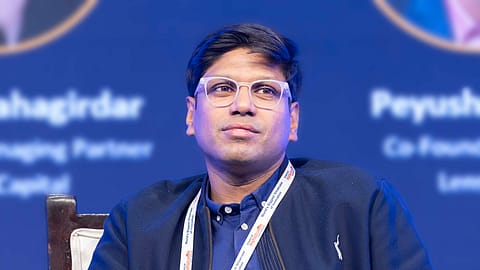Lenskart IPO: Peyush Bansal’s firm to raise ₹7,278 cr at ₹70,000 cr valuation; issue opens Oct 31
The price band for the Lenskart IPO has been fixed at ₹382-402 per equity share of the face value of ₹2 each.

Peyush Bansal-led eyewear retailer Lenskart Solutions is set to launch its initial public offering (IPO) on October 31, aiming to raise ₹7,278 crore at a price band of ₹382-402 per equity share with a face value of ₹2 each. At the upper end of the price band, the market of the market valuation is pegged at around ₹70,000 crore (approximately $7.97 billion), positioning Lenskart among the country’s most valuable consumer-tech listings in recent years.
The three-day IPO, which closes on November 4, comprises a fresh issue of ₹2,150 crore and an offer for sale (OFS) of 12.76 crore shares worth ₹5,128.02 crore, according to the company’s draft filing.
The anchor book will open on October 30, and the share allotment is likely to be finalised on November 6, with listing on the BSE and NSE scheduled for November 10.
The lot size for retail investors is 37 shares, requiring a minimum investment of ₹14,874 at the upper end of the price band. The company has reserved up to 75% of the shares for qualified institutional buyers (QIBs), not more than 15% for non-institutional investors (NIIs), and remaining 10% for retail investors, including employees. A discount of ₹19 per share will be offered to eligible employees.
Under the OFS, Japanese investor SoftBank, Mumbai-based private equity firm Kedaara Capital, Singapore’s state-owned investor Temasek, Alpha Wave Ventures, and promoters Peyush Bansal, Neha Bansal, Amit Chaudhary, and Sumeet Kapahi plan to offload shares.
As of now, the promoter group, including co-founders Peyush Bansal, Neha Bansal, Amit Chaudhary, and Sumeet Kapahi, holds a 19.96% stake in the company, with Peyush Bansal alone accounting for about half of it (10.28%).
Ahead of the IPO, billionaire investor Radhakishan Damani, founder of Avenue Supermarts (DMart), invested around ₹90 crore in the eyewear retailer during its pre-IPO funding round.
Recommended Stories
Of the ₹2,150 crore raised through the fresh issue, ₹272.6 crore will be used to establish around 620 new company-owned, company-operated (CoCo) stores across India by FY29, while ₹591.4 crore has been allocated towards lease deposits for its existing outlets.
The company also plans to deploy ₹213.4 crore to strengthen its technology and cloud infrastructure, with a focus on expanding AI-driven fulfillment systems and robotic lens manufacturing facilities. Additionally, ₹320 crore has been earmarked for brand marketing and business promotion activities.
On the financial front, Lenskart posted a net profit of ₹297.3 crore in FY25, reversing a loss of ₹10.2 crore reported in FY24. Revenue grew 23% year-on-year to ₹6,652.5 crore, marking a 33% CAGR over the past two years. Gross margins expanded by over 500 basis points to around 69%, supported by operational efficiencies and scale benefits.
The IPO marks a significant milestone for the Gurugram-based company, which has grown from an online eyewear platform to an omnichannel retail brand with a strong presence across India and key international markets.
(INR CR)
Founded in 2010 by Peyush Bansal, Amit Chaudhary, and Sumeet Kapahi, Lenskart today operates 2,723 stores worldwide, comprising 2,067 outlets in India and 656 international stores as of March 31, 2025. The eyewear retailer competes with established players such as Titan Eyeplus, GKB Opticals, Lawrence & Mayo, Specsmakers Opticians, and numerous smaller unorganised retailers.
The company, known for its in-house brands including Vincent Chase and John Jacobs, sold 27.2 million eyewear units across markets in FY25. Lenskart owns and operates manufacturing facilities in Bhiwadi (Rajasthan) and Gurugram (Haryana), along with plants in Singapore and the United Arab Emirates. Additionally, through its joint venture—Baofeng Framekart Technology Ltd.—the company manufactures frames in China.
(DISCLAIMER: The views and opinions expressed by investment experts on fortuneindia.com are either their own or of their organisations, but not necessarily that of fortuneindia.com and its editorial team. Readers are advised to consult certified experts before taking investment decisions.)